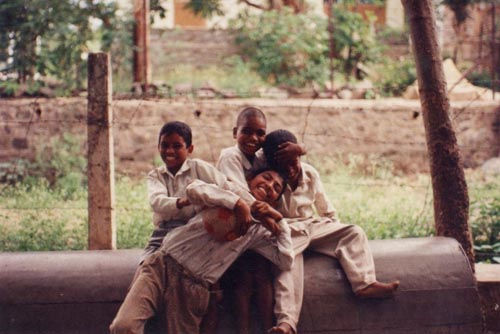About Us
Pragat Shikshan Sanstha (PSS) started as a literacy class for the out of school children in a slum of Phaltan town where the population belongs to the Scheduled castes and Nomadic tribes. The education endeavor that began through the inspiration of one young woman of American origin has grown to include a multifaceted educational programme addressing various educational problems. It includes a programme for the children, youth and women of the same slum area where it first started, a full time Marathi medium school, an Early Childhood Education programme, classroom based pedagogical research and an outreach language and science programme for government schools.
The strength of PSS lies in nurturing children through 13 years of schooling with exposure to nature and environment, books and art to develop them as caring youth having a firm belief in the values of the constitution.
In 1990, the founder of PSS Dr. Maxine Berntsen carried out a survey of reading-writing proficiency among the third standard students of Zilla Parishad, municipal and private schools. She was dismayed with the results and wrote a report called Collapse at the Foundation. Following this report Dr. Berntsen offered to help the government schools with a method evolved by her and tried and tested kamala Nimbkar Balbhavan for teaching reading and writing to first standard children. It is called the Pragat Vachan Paddhati and has shown the same good results in the Zilla Parishad schools.
The double helix of DNA in the PSS emblem perfectly represents our philosophy of equality. The line "Let all things in creation be friends" comes from the Pasaydan, written by the famous Maharashtrian saint, Dnyaneshwar.

Our Philosophy
"Our dream is of a world where no child will be deprived of education, or be forced to attend a school that will mutilate their spirit"
Every child is born with the urge to grow, to develop, to dream and explore the world around her. As she leaves the security of her family it is the school that fosters—or hinders—her first steps into the larger world. If the school is a welcoming, joyous place, the child learns to trust the world and feel secure in it.


We believe that all the children have a right to good education, an education that nurtures and strengthens their spirit and gives them a chance to dream.
A school should be a place where children learn and construct knowledge at their own pace in a free and caring atmosphere. The education at school should be grounded in children’s social and cultural context to ensure that it does not (and should not) alienate them from their homes and families.
%20%20(1)%20(1)%20(2).jpg)
%20%20(1)%20(1)%20(2).jpg)



